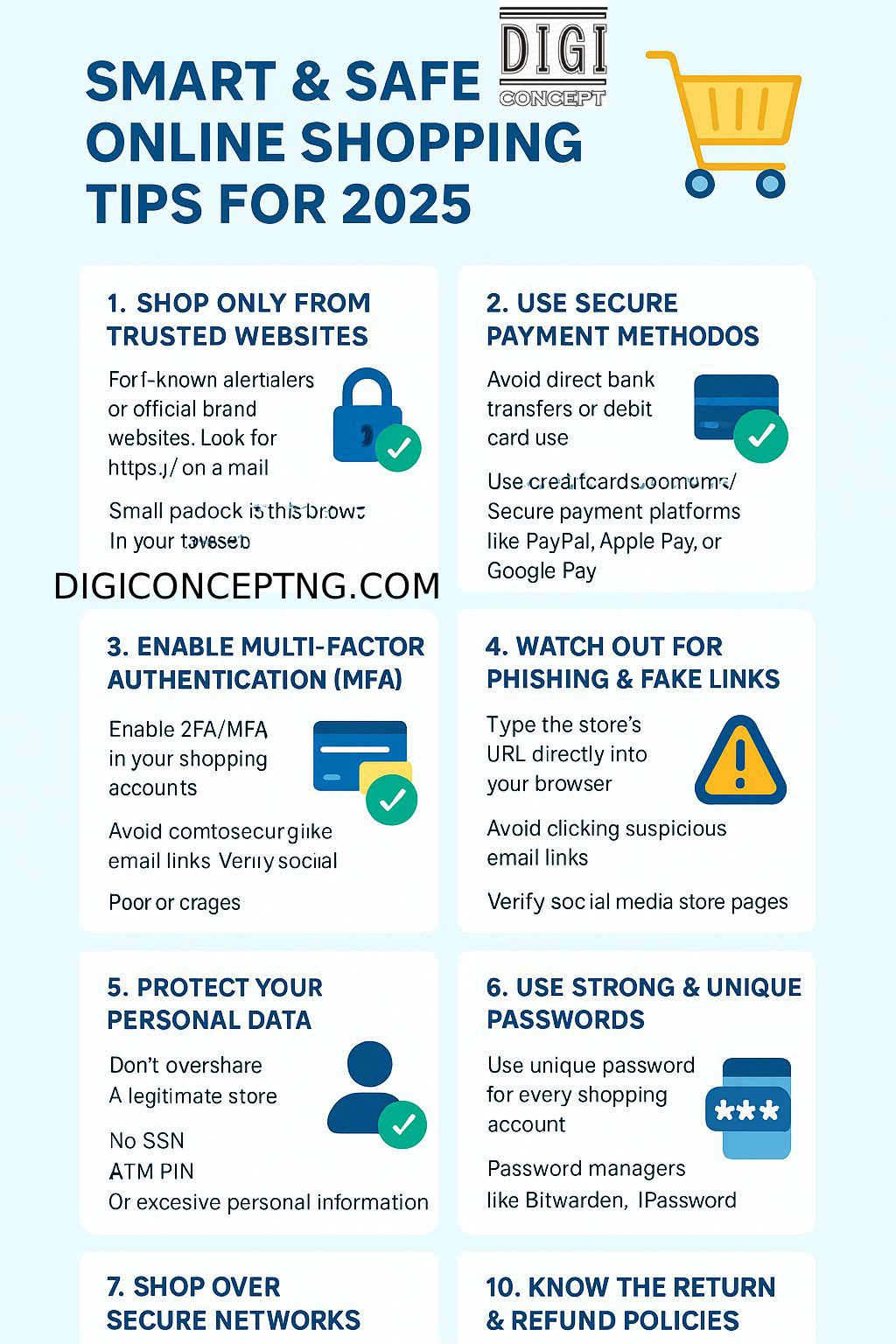Shopping online is fast, convenient, and often cheaper but it also comes with risks. From phishing scams to fake websites, cybercriminals are constantly devising new tricks to steal your money or personal data. If you want a stress-free and secure online shopping experience, you need to shop smart.

Below are the latest proven tips for safe online shopping in 2025.
1. Use a Secure Connection Before Ordering
Always ensure you’re shopping from a safe environment.
- Turn on your computer’s firewall and update antivirus software.
- If you’re using Wi-Fi, make sure it’s encrypted with WPA2/WPA3.
- Avoid making purchases on public Wi-Fi (cafés, airports, malls) unless you’re using a VPN. Hackers often set up fake hotspots to steal card details.
2. Shop From Trusted and Reputable Merchants
Stick to well-known online stores and payment gateways like Paystack, Flutterwave, Interswitch, Quickteller, Jumia, Amazon, or eBay.
Get TikTok SEO Cheat here
- Look for reviews and ratings on platforms like Trustpilot before buying from a new website.
- Ensure the site uses secure payment processors. Avoid direct bank transfers to strangers.
3. Watch Out for “Too Good to Be True” Deals
Scammers often lure victims with massive discounts. If the price looks unrealistic, it probably is.
- Many fake shops use the “bait and switch” trick: they offer low prices, collect your details, then claim the product is out of stock.
- Stick to official sales seasons (Black Friday, Cyber Monday, festive promos) where discounts are genuine.
4. Be Careful With Gift Cards
Before buying or sending a gift card:
- Make sure it’s from a reputable store.
- Read the terms and conditions—some gift cards expire quickly or can only be used in specific regions.
- Remember: no legitimate business asks for payment in gift cards. That’s a common scam red flag.

5. Don’t Overshare Personal Information
Legitimate stores only need your name, delivery address, email, phone number, and payment method.
- Never provide your BVN, social security number, driver’s license, or bank login details to an online store.
- Always check the privacy policy to see how your data will be used. Choose companies that protect your data, not those that sell it.
6. Create Strong, Unique Passwords
If you must create an account, make the password unique.
- Use a combination of uppercase, lowercase, numbers, and symbols.
- Consider a password manager like 1Password, Dashlane, or LastPass to generate and store passwords securely.
- Enable two-factor authentication (2FA) for an added layer of protection.
7. Check for HTTPS and Security Certificates
Before entering any sensitive information, confirm the website address starts with https:// (not http://).
- Look for a padlock symbol in the browser’s address bar.
- Click on it to verify the site’s security certificate.
8. Use a Credit Card, Virtual Card, or PayPal
Credit cards and platforms like PayPal, Apple Pay, or Google Pay offer stronger fraud protection compared to debit cards.
- In Nigeria, you can also use virtual cards from fintech apps (e.g., Chipper, Barter by Flutterwave, or Kuda) for safer transactions.
- If your details are stolen, you can quickly block the virtual card without affecting your main bank account.
9. Check Shipping and Return Policies
Before placing an order, confirm:
- The shipping cost and estimated delivery time.
- Whether the store provides tracking numbers and insurance.
- The return policy—some scammers avoid returns altogether. A reputable store will clearly state their return/refund rules.

10. Use a Reliable Internet Security Program
Invest in updated security software that offers:
- Anti-phishing protection
- Identity theft monitoring
- Real-time malware detection
Some of the top-rated options in 2025 include Bitdefender, Norton 360, and Kaspersky Premium Security.
Always monitor your bank alerts. If you notice any unauthorized transactions, contact your bank immediately and block the card.
By following these steps, you can enjoy online shopping without falling victim to fraud.
Read also: